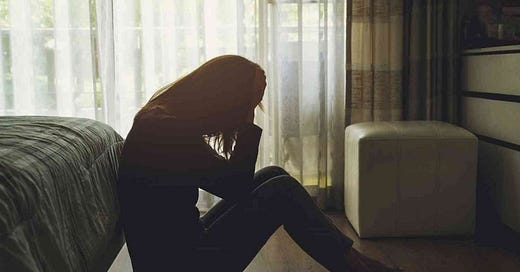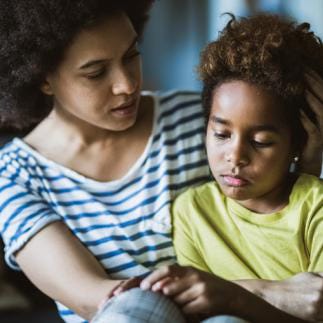Protecting your mental health is not the same as looking away
The key to staying engaged in activism is titrating your exposure to trauma
A couple of weeks ago, as graphic images and horrific stories of the terrorism at a concert in Israel filled our social media feeds, I posted a story to Instagram entitled, “How to Protect Your Mental Health When the News is so Stressful.” Some followers thanked me and said they found the tips helpful, but others left comments on the post or DM’d me to say they were unfollowing me for “suggesting that people could or should look away” from what’s happening in the Middle East.
Although my post specifically said, “We want and need to stay informed, but the overconsumption and repetition of the same narratives and images can be traumatizing, especially for sexual assault survivors or sensitive people,” I was accused of being privileged, uninformed and unengaged.
But after a decade of working on the frontline of gun violence prevention activism, I know a thing or two about trauma exposure. In fact, with a war unfolding and even more horrific suffering in Gaza, I’m doubling down on my original advice: you are right to titrate your — and your children’s — exposure to trauma.
The truth is that exposing yourself to trauma repeatedly and without safeguards won’t make you more informed or a better activist — it will just make you unwell. In the early days of Moms Demand Action, we realized that when we shared graphic photos of gun violence online, they didn’t actually create engagement among our supporters, but instead resulted in: 1) people turning away from the violence and our organization because they were overwhelmed, or 2) people becoming numb to the violence they were seeing. (For those same reasons, many gun violence survivors are opposed to providing photographs of their loved ones’ bodies to the media for public consumption).
Human life is — or should be — sacred, and to repeatedly see it degraded (even on tiny screens) can result in vicarious trauma, a term coined in 1990 by clinical psychologists Lisa McCann and Laurie Anne Pearlman. McCann and Pearlman researched how therapists were impacted by their exposure to clients’ trauma and found it created a cumulative effect that led to flashbacks, intrusive thoughts and nightmares. They also found that vicarious trauma can make people feel emotionally numb or hyper-aroused, cause them to engage in destructive and addictive behaviors, or feel as though they’ve lost a sense of meaning.
“…there is a cost to staring at the acts of humans at their worst,” Alex Kingsbury, New York Times
The fact that I ‘m not a gun violence survivor is why, in part, I believe I was able to lead Moms Demand Action for so many years. Layering that trauma and grief on top of constant exposure to others’ tragedy, suffering and political extremism would have been unsustainable. That said, I’m in awe of the volunteers who are also survivors and still do this work every day. As an organization, we’ve been adamant about “self-care” and the need for volunteers to take breaks. Activism is a marathon, not a sprint, but it’s also as a relay race. When activists need to prioritize their wellbeing or the needs of their family, they should hand the baton over to someone else until they’re ready to take it back. That’s not weakness or uncaring — it’s strength and wisdom.
To be clear, I’m not giving anyone a pass to sit on the sidelines and watch “Queer Eye” while tragedies unfold around them in the world; we all have an obligation to get engaged in some way. But as a full-time volunteer advocate who worked on gun violence and related tragedies at all hours of the day, every day of the week for years, I learned that the only way to stay in the fight longterm is to protect both my mental and physical health. For me, that means meditation, working out, a bath before bed, getting outdoors on weekends, having a hobby, leaning on my support system, sticking to a strict sleep routine, and — yes — limiting my exposure to graphic images and stories.
“Self-care is not selfish. You cannot serve from an empty vessel,” Eleanor Brownn
I remember one Christmas Eve day — after a shooting at a university in North Carolina — I spent the entire day in bed crying because I couldn’t get the victims’ stories, and their grieving families, out of my mind. One kid, in particular — Riley Howell — haunted me because he looked so much like my own son. Riley was killed when he heroically stepped in front of a gunman in his classroom to protect his fellow classmates. It made me start catastrophizing about my son’s safety — not just at college, but in the world. Thankfully, my husband recognized that I needed a break, and I took one. When I returned, I was ready to take up the mantle again.
Certainly, taking a break is not a privilege afforded to people who are in the middle of a humanitarian crisis, but what victims of violence actually need is for all of us to get engaged and to stay engaged in the fight for our humanity — not for a week or a month, but for as long as it takes. And I’ve seen firsthand that the people who are unable to stay engaged in activism longterm are the same people who aren’t able to create consistent boundaries to protect their mental and physical health.
With that in mind, here are some tips from experts on how to protect yourself:
Limit your time engaging with the news: Literally set a time if you have to. Give yourself about 30 minutes per day total of social media scrolling and news exposure combined.
Carve out a window for taking in information: Designate times throughout your day when you read the news, but never before bedtime.
Choose the least disturbing form of media: If live footage affects you negatively, avoid the television. Listen to a podcast instead.
Subscribe to a curated newsletter or podcast: Find one or two that curate and synthesize information in one place so you don’t have to doom scroll. I highly recommend
.Volunteer, donate, advocate: Avoid feeling powerless by doing something positive and proactive, whether it’s donating or reaching out to someone in need of support.
Just as adults are at risk of being traumatized by images and videos of war and conflict, so are children. When parents are worried or anxious or feeling overly sad, that spillover affects their kids. Research over the last several decades shows that exposure to war and violence — even on television — can have a significant negative impact on children, including anxiety and symptoms of post-traumatic stress.
Experts suggest the following:
Be proactive about starting conversations: Children of all ages deserve a conversation. Use open-ended questions to start a conversation: "'Have you heard what's been going on in the world?' 'Have you heard anything about what's going on in Israel and Palestine?' See what they say and take it from there.
Be age appropriate: Older children with access to the internet should be encouraged to be skeptical of videos shared on social media and offered help with evaluating news sources. Younger children need to be assured of their safety.
Have an open mind: The best conversations with children about difficult subjects often means talking less and allowing kids to ask questions. They need context more than our opinions or political positions.
It's OK if you don't have all the answers: You don’t need to be a historian or a political scientist. Usually what kids are actually asking is, “How can I live in a world where all sorts of terrible things that happen?” As pessimistic as you may feel about the state of the world, allow your child the freedom to imagine (and work toward) a better future.
Bottom line: Don’t let anyone tell you that setting boundaries to protect your ability to stay well and persevere is tantamount to disengaging. You have a right and an obligation to take care of yourself in a world where tragedies and suffering — and the work to fix them — sadly won’t stop during your lifetime. Staying well in the short-term will enable you to stay in the fight long-term.







I am absolutely up to date on the horrific violence in Israel/Gaza. But I have not watched any videos of people being murdered or injured. I am so appreciative of your comments and agree.
Amen.